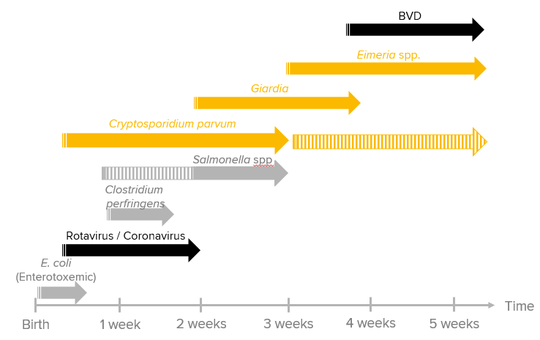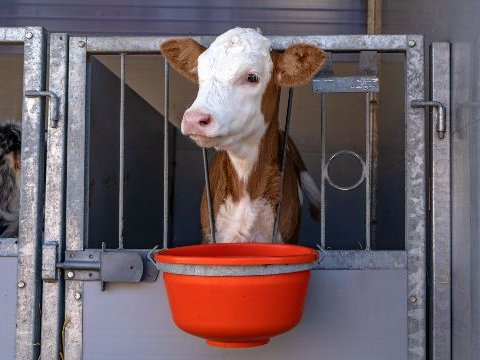Scours in calves: Improving resilience from the start
Calf diarrhea is a common disease in young animals worldwide. It entails high productivity- and economic losses and in the worst-case scenario, it may even lead to calf mortality. In the fight against this dreaded disease, the main focus is on controlling the pathogenic pressure and strengthening the calf’s resilience. In the course of the current measures, especially phytogenic (plant derived) feed additives have gained increasing popularity in recent years. Read about some beneficial effects of these natural bio actives when being used in calf nutrition to counteract scours in calves.

Diarrhea is the most prevalent disease affecting rearing calves, as shown by a study from Dairy Heifer Raiser in the US: one out of four live calves has at least one bout of diarrhea before weaning; more than 1 out of 2 calves experiencing sickness is affected by diarrhea. It can be caused by a variety of infectious agents or by feeding management mistakes. The pathogens responsible can be bacterial, viral, or protozoal, as illustrated in grey, black, and orange in Figure 1.
Depending on the cause, the occurring time, the symptoms (feces color and consistency) and the treatment of scours vary.
Consequences of diarrhea and treatment

Whichever the responsible pathogen, diarrhea results from reduced nutrient absorption and an imbalanced osmolality, leading to fluids passing through the gut epithelial wall to the intestinal lumen. This “leaky gut” provokes dehydration of the calf and degradation of the gut barrier. In some severe cases or if the gut wall is directly attacked (as in coccidiosis or cryptosporidiosis for instance), it is possible to observe pieces of mucus layer and blood in the feces.
This directly impacts the calf’s health and its chances of survival if the disease is not detected in time and treated appropriately. If the calf survives, the scour episode has an immediate negative impact on the growth performance of the animal due to the reduced nutrient absorption and adverse long-term results. It has been demonstrated that calves with diarrhea are more prone to other diseases and have a lower lifetime production than calves that remain healthy. It is essential to consider that diarrhea has economic consequences on the rearing cost due to treatment costs, extra work time devolved to sick animals, and the long period of the unprofitability of the animal because of the lower growth rate.
Did you know?
The extra rearing cost due to sickness has been estimated to be 95€ per sick calf, compared to a healthy one.
Treatment of scours in calves must be adapted to the responsible pathogen. A diagnosis must be performed to decide the type of treatment and its duration, as an association of pathogens is relatively common, and secondary bacterial infections can occur. In all cases, fluid therapy and electrolytes should be administered to the calf to avoid death by dehydration.
After giving you first insights into scours in calves, a current and feared challenge in cattle farming, we now would like to have a look at the causes of this disease and also presenting ways for best possible prevention – of course with the use of our precious substances from nature.

Delphine Lacombe
Delphine Lacombe has joined Delacon in April 2018, as Customer Technical Manager for the ruminant team. She is an agronomist engineer, graduated from Agrocampus Ouest in France, and started working as dairy nutritionist for a feedmill. For the past 10 years, Delphine has been working within animal nutrition industry, mainly in the feed additive business. At the moment, she is responsible for the technical support of the EE and Latam regions.










